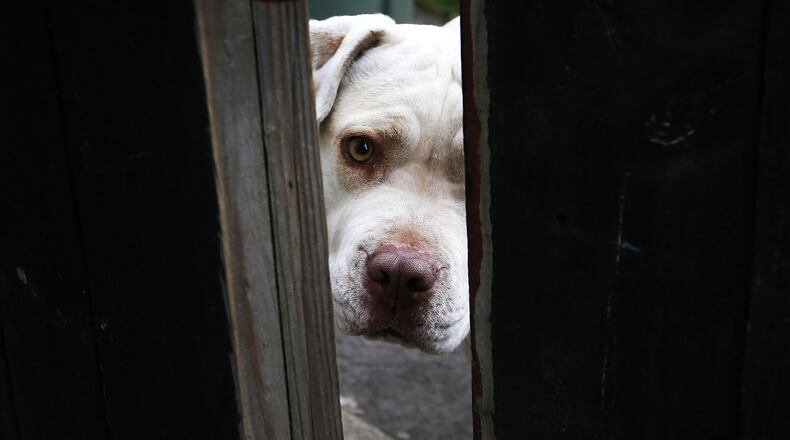In what could be a far-reaching decision for dog-bite cases, the Georgia Supreme Court on Monday said a jury must decide whether a woman viciously attacked by a pit bull named “Rocks” can collect damages from her neighbors.
The unanimous decision sets an important precedent in Georgia in that it helps courts determine whether dog owners may be held liable for their pet’s attack. The question, the court said, is whether the dog previously exhibited such dangerous behavior that its owner should have known it had a tendency to attack someone.
In its decision, the court said if a dog had previously snapped at someone — not actually bitten someone — that could be enough to show that the owner knew he or she had a vicious animal on their hands, the court said.
The ruling revives a lawsuit filed by Lori Steagald against her Henry County neighbors, David and Cheryl Eason, and their son Joshua Eason, who owned the pit bull. Steagald went next door to borrow some tea bags on Dec. 2, 2011, and was attacked by Rocks. She suffered significant scarring and nerve damage.
“I’m pleased with the decision of the Supreme Court,” Steagald said Monday. “It has been a long process, but I knew all along that things would work out and now I am looking forward to the chance to tell my story to a jury.”
The high court’s ruling adds another level of protection to Georgians in dog-bite cases, said Stockbridge attorney Andrew Gebhardt, Steagald’s lawyer. “It doesn’t have to be that there was a prior, obvious bite. It recognizes that a snap is nothing more than a bite that missed its target.”
Jimmy Scarbrough, a lawyer for the Easons, did not return phone calls or emails seeking comment.
The attack occurred shortly after Joshua Eason moved back home with his parents. His mother allowed Joshua to bring Rocks, which he’d rescued from the side of the road six months earlier, provided he build the pit bull a pen inside the fenced-in backyard.
It apparently was not a seamless transition for Rocks. Cheryl Eason told Lori Steagald’s husband, Gary, that Rocks “snapped” at her during his first day at his new home, according to testimony. Also, Gary Steagald said Rocks had growled and snapped at him when he went to see his neighbor’s new dog.
Six days later, when Lori Steagald walked over to borrow the tea bags, Joshua Eason was playing with Rocks in the backyard. The dog, not confined to his pen, was being held by Eason on a lead. After Eason opened the gate for Steagald to enter, she extended her hand so Rocks could smell her.
Rocks then lunged at Lori and bit down on her arm. Joshua began hitting Rocks, trying to get the dog to let go, and screamed for help. Joshua’s dad and cousin ran up and helped get Rocks off Lori. But as Lori tried to run away, she slipped and fell, which enabled Rocks to bite her again, this time on her right calf.
An ambulance arrived and took Lori to the hospital. Rocks was later put down.
“This was an awful attack, the worst I’ve seen in these types of cases,” Gebhardt said. “And no one wants to sue their neighbors. It’s been difficult for everyone.”
Under Georgia law, a person who owns a vicious animal can be found liable if the animal gets free and attacks someone. But the law does not presume that dogs are vicious; in fact, they are considered to be “a harmless species.”
For dog-bite victims to prevail, they must show the dog owner knew his pet had a propensity for violence. In the past, Georgia’s courts have cited the “first bite rule” — that the dog had previously bitten someone and the owner knew about it.
The Georgia Court of Appeals had previously dismissed Steagald’s suit. It found that the prior incidents of Rocks snapping at Cheryl Eason and Gary Steagald amounted to “merely menacing behavior,” particularly with no evidence the dog had previously attacked anyone.
On Monday, the state Supreme Court overturned that ruling and said a jury should decide whether the Eaves had reason to know Rocks was a vicious dog.
“A rational finder of fact could infer reasonably, we think, that Rocks snapping at Cheryl and Gary amounted to the dog attempting to bite Cheryl and Gary,” Justice Keith Blackwell wrote. “An attempt to bite in the absence of provocation most certainly may be proof of a propensity to bite without provocation.”
About the Author
The Latest
Featured




